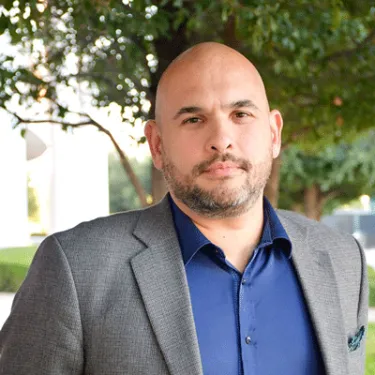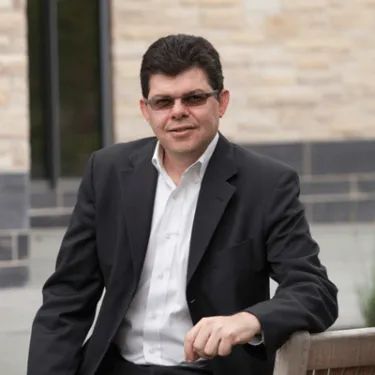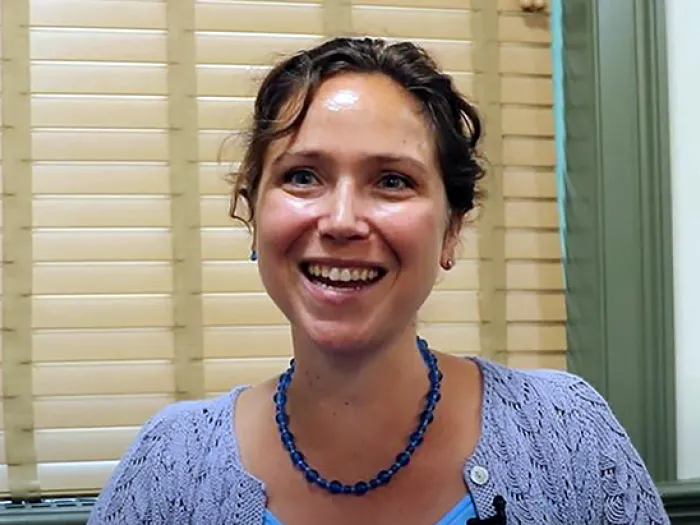The political power of global apostolic networks
Herencia Lectures at Princeton Seminary explore Christian nationalism and internationalism in light of far-right Latinx voters


“We should not be precious about Christianity,” said Dr. Matthew D. Taylor, senior Protestant scholar at the Institute for Jewish, Christian and Muslim Studies in Baltimore, in answer to the question, “Are the movements that comprise Christian nationalism and internationalism even Christian at all?” The question was posed on Monday evening at Princeton Theological Seminary’s Herencia Lectures. “Christianity has given us crusades, inquisitions, pogroms, colonialism, racism,” said Taylor. “I think we have to accept it as a part of Christianity, recognizing that Christianity is a human tradition that was shaped by human hands, but we do have to contrast it with the way of Jesus.”
Started in 2008, the Herencia Lectures are organized by the seminary’s Latine Collegium. This year’s event, titled “Christian Nationalism: A Dangerous Threat to Democracy,” featured four lectures spanning 90 minutes plus an informative and candid question-and-answer period. Event organizer the Rev. Dr. Samuel Arroyo wrote, “This is an important topic that is impacting all our communities. Christian nationalism is taking center stage during this election cycle, and there are times when it is difficult to identify how it is manifesting in our communities, in our churches, in the media, in our classrooms and even in our families.” While the participating scholars swore they did not coordinate in advance, the presentations dovetailed into one another, offering a clear and coherent picture of Christian nationalism, including how to define it, how to recognize its various strains, who comprises its network of leaders, and how this network influences the politics of the United States and Brazil, in particular.
As the term “Christian nationalism” becomes more popular with political pundits and in the news, the definition of it broadens and blurs, argued Dr. Miranda Zapor Cruz, professor of Historical Theology at Indiana Wesleyan University, who emphasized that Christian nationalism is a cultural framework, first and foremost. “Christian nationalism is primarily about culture, not doctrine. Christian nationalism attempts to Christianize the country’s culture and values from the top down by gaining power over government and other cultural and civic institutions.” She identified three strains of Christian nationalism: the Christian reconstructionist movement that advocates on behalf of free markets and education policy; dominionism or “kingdom now” theology, which emphasizes the influence of spiritual warfare in public policy and focuses on the authoritative rule of holy prophets and apostles; and ethno-nationalist Christianity, which in the United States manifests as white supremacy. Christian reconstructionists with ties to libertarianism and the Tea Party have strongly influenced the establishment of home-school networks and private schools, as well as policies for school choice and tuition voucher programs. According to Zapor Cruz, the rhetoric of dominionism, which resurged in the 1980s, took center stage in the 2016 presidential election in the United States, celebrating former President Donald Trump as “God’s chaos candidate” and exhorting violent action in the Jan. 6, 2021, storming of the United States Capitol. Zapor Cruz also summarized the long history of Christian ethno-nationalism in the United States that helped to conflate the cultural identities of Christian and European people and to justify “enslaving, killing and forcibly removing those who were not Christian or European,” as well as stoking opposing later movements to offer citizenship or protect the equal rights of non-white ethnic groups. Later in the evening, Zapor Cruz described her teaching context as one in which many of her students come from Christian homes and plan to enter the ministry but are unaware of Christian communities and movements outside their own experience. She intends her research and teaching to help Christians like her students become more aware of the ways a Christian nationalist agenda may be shaping our society and to discern their own response to it.

“Christian nationalism is not a Christian approach to politics,” said Zapor Cruz, who warned that the confusion surrounding the term in the press may be influencing Christian moderates to embrace it and come under its influence without fully understanding its roots, agendas and methods. Rather, said Zapor Cruz, “it is a political ideology that is sometimes undergirded by theological convictions and that uses Christian symbols and language to advance a nationalist agenda,” before she called it “inimical to both Christian orthodoxy and American democracy” because of its embrace of authoritarianism, xenophobia, misogyny and violence to enforce its agenda.
Building on the definitions of Christian nationalism and the historical influence its movements have had on politics in the United States, the second lecture considered its influence on Latinx communities recently moving toward far-right political agendas and candidates. After agreeing with Zapor Cruz that “race and religion are seemingly ineradicably entwined in the history of the United States,” Taylor asked, “How do we account for non-white, non-native-born Christians’ embrace of American Christian nationalism?” From research of the Public Religion Research Institute within the past two years, Taylor suggested that “demographic surveys show that non-white Christians actually share Christian nationalist sentiments that sometimes surpass white American Christians.” According to Taylor, “Hispanic Protestants may rival white evangelicals in adhering to Christian nationalist ideology.” He explained this by focusing on the networks of the most influential Latinx Christian leaders in American politics, mainly Trump’s Latinx advisers. While “all of these Latinx advisors are Protestants and evangelicals,” said Taylor, more than half are “independent charismatics, megachurch pastors, apostles and televangelists.” Their apostolic networks are more freely governed, fluid and transnational than traditional denominational structures or American evangelical associations and “rival the size of even the largest American denominations, except they are spread out all over the globe,” said Taylor. He suggested that the vision of these global charismatic movements transcend an “American First” political agenda and embrace dominionist ideology, reinterpreting the “Great Commission” passage Matthew 28. Apostles are called not to go and make disciples of people in all nations but to make disciples of all nations. Taylor explained how, through this interpretation echoed in the mission statements of these global apostolic networks, “apostles are commissioned to disciple nations so that the nation itself becomes the object of Christian mission.”
The influence of Christian internationalism plays out in the strong connection between former President Trump and right-wing nationalist Jair Bolsonaro, president of Brazil from 2019–23, and the similarities between the election protests of Jan. 6, 2021, in the United States and Bolsonaro’s supporters’ storming of Brazil’s Congress, Supreme Court and presidential palace on Jan. 8, 2023, when current President Luiz Inácio Lula da Silva took office. In 2021, the last two speakers at the Herencia Lectures wrote an article for the Christian Century about Christian nationalism in Brazil and its transnational ties. Dr. João B. Chavez, assistant professor of the History of Religion at Baylor University, and Dr. Raimundo C. Barreto, associate professor of World Christianity at Princeton Theological Seminary, are currently at work on a book covering the subject.

“We are tentatively calling it ‘Multi-Directional Theopolitics of Domination,’” Chavez said during the opening of the third lecture of the evening. He described the book as looking at “Brazil-based, transnational coalitions of folks who are in these networks of the Christian far right.” In his lecture, Chavez described the current religious and denominational affiliations of Brazil. Protestantism, especially Pentecostalism, is on the rise, as is their influence on Brazilian politics, where 70% of evangelicals voted for Bolsonaro in 2018 and 2022. “It is estimated that approximately 80% of Brazilian Protestants are Pentecostal,” said Chavez, who said by 2040, projections suggest the majority of Brazilians will be Protestant. Along with the surge in Pentecostalism is a rise in politicians who campaign using evangelical titles such as “bishop, pastor and reverend.” In the 2022 elections, more than 500 candidates campaigned with such titles. Founded in 2003, the evangelical caucus Frente Parlamentar Evangélica or Bancada Evangélica is a loosely organized group of evangelical lawmakers in Brazil that would be the third largest political party if it were a party and not a caucus. According to Chavez, 202 congressmen and 226 senators are currently members.

Barreto explained that he and Chavez were “caught by” the research about Christian transnationalism in Brazil because of the parallels between the Christian far-right influence on politics in Brazil and the United States. In the fourth and final lecture of the evening, Barreto described the historical identification between being Catholic and Brazilian, the rise in Pentecostalism, and the emergence of ideologies of dominion by Brazilian evangelical leaders advocating for a semi-theocracy.
Christian nationalism “is not national; the end game is the Kingdom of God,” said Barreto, who explained that this kingdom is narrowly defined to align with hierarchal political and patriarchal social orders.
“Christianity in both societies, Brazil and the United States, is a religion of privilege,” Barreto said in answer to the question about whether or not Christian nationalists are Christian. “It is part of Christianity, and I think we have to take some responsibility for what it is.” He urged people who find Christian nationalism problematic not to denounce their claims to the Christian tradition. “We have to think about the consequences and then reposition ourselves,” said Barreto, who encouraged the audience to dispute the narrative of Christian nationalism and make sure that other voices and faith claims are heard.
You may freely reuse and distribute this article in its entirety for non-commercial purposes in any medium. Please include author attribution, photography credits, and a link to the original article. This work is licensed under a Creative Commons Attribution-NonCommercial-NoDeratives 4.0 International License.




